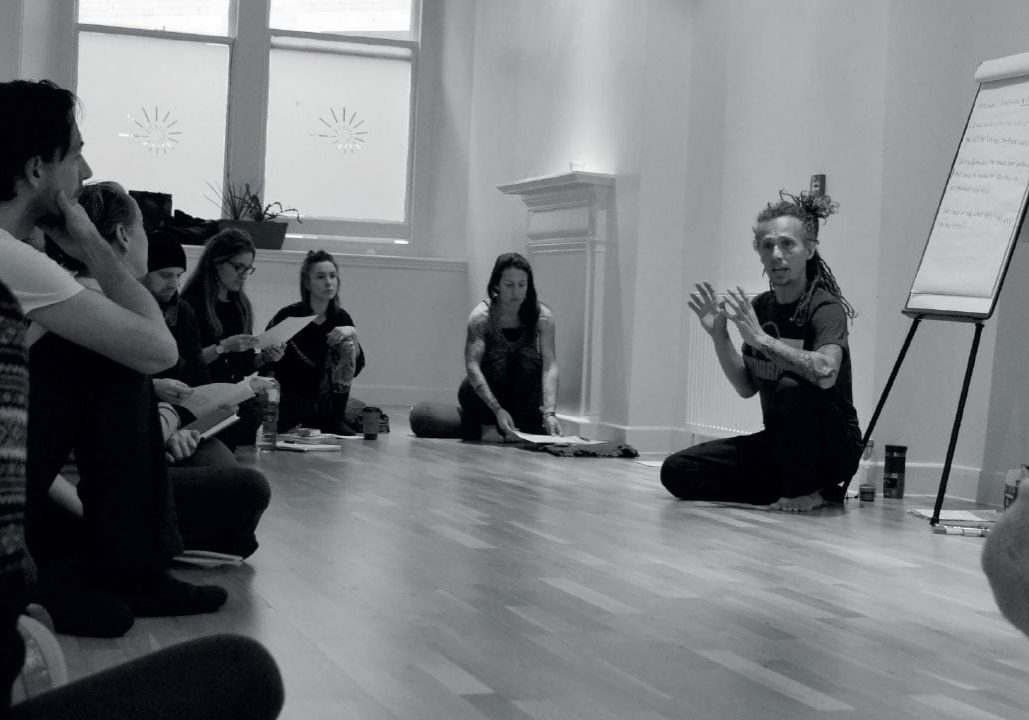
The ‘Be’ Before Breakfast Club
At the start of 2023, yoga teacher Dan Peppiatt launched a simple online class to help people begin their day with meditation, with a group practice held at 6am, three times a week. Almost a year later, the ‘Be’ Before Breakfast Club is still going strong. He says it highlights the most important aspect of any yoga or meditation practice: consistency
Reading time: 6 minutes
In January, I started the BB4 Breakfast Club, it was a very simple idea in principle: get people out of bed to meditate online at 6:30am three times per week for the entire month so that they could establish a consistent meditation practice. If you had told me at the time that we would still be going strong almost a year later I would have laughed — yet what started out as a new year’s resolution/experiment grew into something far more profound!
I know that meditation and mindfulness have the potential to work for people, because they worked and continue to do so for me. As somebody that spent much of my life, from as early as I can remember, suffering from crippling anxiety and bouts of depression along with frequent frustration, impatience and the fear-based anger that accompanied it, I am a pretty good test subject for its value.
At the same time, I have never been under the illusion that it is a one-stop fix for everyone. But what I have discovered over at least 30 years of practice is that the reason it doesn’t work for most people is that there is no long-term consistency to their practice.
Why is that? Why do people drop it so easily?
The simplest reasons why people drop meditation are the most obvious — it's challenging, and because it's hard, it's an easy habit to let slip. For some reason, people think that because they find it so tough it must not be for them. That's odd because you'd hardly take up piano lessons and then quit after the first couple because it was hard. Yet people seem to think that because they can't seem to flick a switch and experience an imagined state of bliss or absence of unwanted ‘stuff’, that it isn't for them, and so it’s natural to drop it.
Humans like to see results; to see something tangible if they try hard. They go to the gym and generally feel healthier or see bigger muscles; they read a book or study a course and normally feel more educated or attain greater understanding. Yet with mind[1]based practices, there is, more often than not, no instant gratification. Yes, you might be lucky enough to experience the happy side effect of feeling less troubled by your current worries, or enjoy a quieter mind, but that certainly isn’t the case for everyone. For many, if not most people, it can feel like a really hard and frustrating slog, as if they are somehow engaged in a battle with their minds.
Much of this is because these practices don’t work in the same way as exercising or studying — you can’t ‘try harder’ at this. It is totally paradoxical in the way it works and our normal strategies don’t apply — apart from the strategy of commitment and persistence.
I’d go so far as to say that you can’t even ‘do it’. Everything else in life is very much a ‘doing’, but meditation and mindfulness are in truth a ‘not doing’ — this might sound very odd and it’s where a teacher is very important to carefully explain why that is the case.
I’ve been very fortunate to have had some great teachers over the years (including very experienced teachers in Buddhism, yoga, Vedanta and Taoism) and I have had the chance to ask them all of the questions on my mind and to receive some useful guidance along the way.
Sadly though, these practices are often taught out of context, without any explanation as to how they all fit together: concentration, mindfulness, self[1]investigation and active practices such as nurturing useful states of mind, like patience and kindness. They aren’t at all random, they are very much interconnected, but without useful guidance the frustration and confusion that people encounter are often enough to put them off after a short while. The meditation practice isn't maintained, maybe because the teacher might not explain, or even understand, what is going on inside for people. The possible early benefits of ‘the honeymoon period’ pass quickly and then it just seems like pointless hard work, getting nowhere fast.

So maybe that gives some context to the BB4 Breakfast Club group and what I hoped to establish.
After sharing meditation with probably thousands of people from every walk of life I came to see that absolutely everyone had the same struggles; the same general mental ‘obstacles’. Whether they were Olympic gold medal athletes, Forbes list personalities, five-year-old kids with school phobia or inner city youths, I have worked with them all, but us humans all boil down to the same basic fundamental worries and fears.
I also saw clearly that the only people to benefit long-term were the ones that stuck with the practice long-term. Meditation filters into your life, you absorb it rather than learn it and it slowly changes everything. The way in which you relate to yourself, to thoughts, to other people and to situations, all shift as the world that we tend to create as a story in our own heads becomes infused with a clarity that was always there but had somehow simply been overlooked. We start to see that so much of what we believed was ‘true’ was actually just a story that we were overlaying over life — just an opinion, or a perception, and that those perceptions and opinions are peculiar to us, they aren’t universal truths shared by everyone.
So there was the consistency element, but how do I get people to commit?
One of the main aids to commitment is community; the power of a group has an energy that sweeps everyone along with it. When you get up in the dark in winter and realise that 30 other people have also got up in the dark, there is a real power in that. When somebody shares something that they have realised, or a struggle that they are having with the practice, or another way of understanding something, many of us will also resonate with that struggle, with that understanding, or with that confusion. We start to see that we are not at all alone.
The next aid to committing is fitting it in with life regularly. I did some research among people I know and the general consensus was that their day usually got going around 7am, so anything before that could work. It also meant they would get their practice in first thing and the benefits of that then feed into the rest of our day. Feedback since has suggested that this is exactly the case and for many it has replaced the unwanted previous habits or getting out of bed at the last minute, rushing into the day, checking the phone, the news, the work emails and so on. It is a steady, calm and consistent entry into what for most of us can often be a challenging 24 hours.
So, from starting on the 1st January 2023 with 50-60 people, I never anticipated or even considered that it might be more than a January thing. But then odd emails started to drop into my inbox around mid January: would I consider running it into February… until the weather was turning better…then in February, the same thing, and March and April, until it just became a given that I would run it if people wanted it.
Of course some people dropped out, while new people joined, some returned and there is now a constant ebb and flow; that's just normal life. But numbers are always consistently around 30 or so, with a hardcore crew that have been there since day one.
Some never make the morning session, it's just too early for them or they have to make the school run early or commute and they will watch that morning’s session back later in the day. We are now at the point where we have over 100 pre-recorded meditations to back up what we are doing. From concentration practices, to relaxation, yoga nidra to mindfulness, breathwork to self-enquiry, nothing is left untouched or unexplored because different things work for different people.
So we continue, almost at the year’s end now, and no clear sign of any end in sight. On the rare days I can't lead the session we have other teachers in the group who are able to step in and cover for me. This is also really valuable for the group to hear other voices and opinions to mine. I also aim to start inviting some of my own teachers and others that inspire me to lead occasional sessions; it's a pretty amazing thing that just grows under its own momentum.
Very casually, not being forced, it’s still by donation and most people pay less than £1 per session, while those that can afford to donate a little more, and those that can't afford anything come along entirely free. The whole group supports each other; it certainly isn’t my thing, it is a group effort and I truly love seeing every single face (the ones that have a camera turned on anyway!) in the mornings when I'm still trying to get my eyes to focus on the laptop screen.
Why not join us and start a new healthy habit with a great likeminded community? We meet every Monday, Wednesday and Friday at 6:30am. People can attend ‘live’ or watch sessions later — and you don't even have to have your camera on or say anything (most people don’t, it's far too early!). The sessions are open to anyone and everyone who feels it might be of use.




